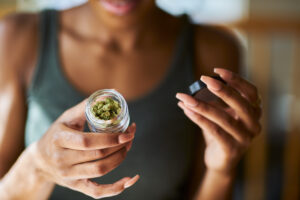Does Chamomile Tea Make You Sleep?
If you’ve been looking for ways to sleep better, you’ve likely come across chamomile tea at some point. Chamomile is an herb with small, daisy-like flowers consumed by people across the world to improve health, including sleep .
The chamomile plant’s name comes from Greek terms for “ground apple,” because of its fragrance. There are many chamomile varieties, but German and Roman chamomile are those generally made into tea and used for sleep and health. We explore how chamomile tea impacts sleep, as well as its other possible benefits.
Is Chamomile Actually Good For Sleep?
Chamomile is considered to be a mild sedative or tranquilizer, which means it may relax the nervous system and promote sleep . A meta-analysis of 12 randomized, controlled trials found that chamomile improved sleep quality . One study found that chamomile helped people with insomnia function slightly better during the day . Chamomile has also been found to improve sleep in women during menopause and after pregnancy .
A flavonoid called apigenin is likely the component of chamomile that causes a sedative effect. Flavonoids are natural substances known to positively impact health that can be found in a variety of vegetables, herbs and fruits . The flavonoid apigenin has been found to bind on benzodiazepine receptors in the brain. Prescription drugs that bind to benzodiazepine receptors usually treat insomnia, anxiety, or seizures . Camomile is one of the richest natural sources of apigenin.
Does Chamomile Tea Have Caffeine In It?
On its own, chamomile tea is naturally caffeine-free. However, manufacturers sometimes make mixes that include multiple different types of teas. Check the label before drinking chamomile tea to make sure it hasn’t been combined with another type of tea that contains caffeine. Drinking tea that contains caffeine in the hours before bedtime can disrupt sleep .
Benefits of Chamomile Tea
Research studies suggest that chamomile tea or supplements may help prevent or treat a wide variety of health-related issues beyond sleep. It has been regarded as an anti-inflammatory, a diuretic, and an analgesic. More research is needed to confirm, since many of chamomile’s benefits have been found in animal studies, but not yet proven in humans .
- Anxiety
- Arthritis
- Back pain
- Bedsores
- Cancer
- Cancer treatment side effects
- Cardiovascular disease
- Common cold
- Depression
- Diarrhea
- Flatulence
- High blood sugar
- Inflammation
- Kidney damage
- Intestinal worms and parasites
- Irritable bowel syndrome symptom
- Liver damage
- Menstrual pain
- Menstrual-related mood changes
- Mortality
- Nausea and vomiting
- Nerve pain
- Neurological problems
- Osteoporosis
- Oxidative stress
- Stomach ulcers
In addition to being consumed as a tea or supplement, chamomile is sometimes also applied to the skin to treat itching, burns, wounds, and eczema. People may also gargle with chamomile tea or use it as a mouthwash when dealing with mouth or throat inflammation. Chamomile may be added to a bath to soothe anal or genital inflammation. Sometimes just the smell of camomile helps with relaxation. Finally, people sometimes breathe in vaporized chamomile essential oil instead of drinking the tea when treating anxiety and depression.
When to Drink Chamomile Tea for Better Sleep
Some studies suggest that chamomile tea causes tiredness quickly, so drinking it in the evening before bedtime might be best. However, if you find yourself waking up in the night to urinate, you may want to limit the amount of liquid you consume in the late evening and instead drink your chamomile tea a little earlier.
Chamomile Supplements or Tea?
Chamomile is commonly consumed as an herbal infusion mixed with hot water or in a tea form, Most human research studies on chamomile appear to use tea . Chamomile is also available as a dietary supplement in the form of capsules. Whether a person opts to drink chamomile tea or take chamomile supplements is a personal decision.
There doesn’t appear to be research studies comparing the tea and dietary supplement forms of chamomile. That said, many of the components of chamomile are thought to be water soluble, so they may be best able to have a therapeutic effect in the form of chamomile tea.
Is Chamomile Safe?
People have been safely consuming chamomile since ancient times, especially the amounts found in tea. Some research suggests that chamomile is even safe for infants and children, but experts say that chamomile hasn’t been established as officially safe for people in this age group. Similarly, the safety of chamomile is unknown when it comes to pregnant or nursing women and people with kidney or liver disease.
Side effects to camomile are rare but may include nausea or dizziness. A small proportion of people are allergic to chamomile or develop an allergy to it after using it. People with allergies to ragweed, chrysanthemums, or plants in the Compositae family may be more likely to develop a chamomile allergy. Applying chamomile directly to the skin may be more likely to elicit an allergic reaction than drinking the tea.
If you want to try chamomile for a health issue, consider speaking with your doctor . Your doctor can make sure chamomile won’t interfere with any medications you’re taking. Your doctor can also identify if you require any tests or treatments for the issues you’re wanting to take chamomile for.
References
17 Sources
-
Sah, A et. al (2022) A Comprehensive Study of Therapeutic Applications of Chamomile. Pharmaceuticals (Basel) . 2022 Oct 19;15(10):1284. doi: 10.3390/ph15101284
https://pubmed.ncbi.nlm.nih.gov/36297396/ -
Srivastava, J et. al (2010) Chamomile: A herbal medicine of the past with bright future. Mol Med Rep . 2010 Nov 1;3(6):895-901. doi: 10.3892/mmr.2010.377.
https://pubmed.ncbi.nlm.nih.gov/21132119/ -
Hieu, T.H. et. al (2019) Therapeutic efficacy and safety of chamomile for state anxiety, generalized anxiety disorder, insomnia, and sleep quality: A systematic review and meta-analysis of randomized trials and quasi-randomized trials. Phytother Res . 2019 Jun;33(6):1604-1615. doi: 10.1002/ptr.6349. Epub 2019 Apr 21.
https://pubmed.ncbi.nlm.nih.gov/31006899/ -
Zick SM, Wright BD, Sen A, Arnedt JT. Preliminary examination of the efficacy and safety of a standardized chamomile extract for chronic primary insomnia: a randomized placebo-controlled pilot study. BMC Complement Altern Med. 2011 Sep 22;11:78. doi: 10.1186/1472-6882-11-78. PMID: 21939549; PMCID: PMC3198755.
https://pubmed.ncbi.nlm.nih.gov/21939549/ -
Abbasinia, Hanieh & Alizadeh, Zeinab & Vakilian, Katayon & Jafari, Zohreh & poor, Pegah & Ranjbaran, Mehdi. (2016). Effect of Chamomile extract on sleep disorder in menopausal women. The Iranian Journal of Obstetrics, Gynecology and Infertility. 19. 1-7. 10.22038/ijogi.2016.7631.
https://www.researchgate.net/publication/309266429_Effect_of_Chamomile_extract_on_sleep_disorder_in_menopausal_women -
Chang SM, Chen CH. Effects of an intervention with drinking chamomile tea on sleep quality and depression in sleep disturbed postnatal women: a randomized controlled trial. J Adv Nurs. 2016 Feb;72(2):306-15. doi: 10.1111/jan.12836. Epub 2015 Oct 20. PMID: 26483209.
https://pubmed.ncbi.nlm.nih.gov/26483209/ -
Panche AN, Diwan AD, Chandra SR. Flavonoids: an overview. J Nutr Sci. 2016 Dec 29;5:e47. doi: 10.1017/jns.2016.41. PMID: 28620474; PMCID: PMC5465813.
https://pubmed.ncbi.nlm.nih.gov/28620474/ -
Bounds CG, Patel P. Benzodiazepines. [Updated 2024 Jan 30]. In: StatPearls [Internet]. Treasure Island (FL): StatPearls Publishing; 2024 Jan-. Available from: https://www.ncbi.nlm.nih.gov/books/NBK470159/
https://www.ncbi.nlm.nih.gov/books/NBK470159/ -
Drake C, Roehrs T, Shambroom J, Roth T. Caffeine effects on sleep taken 0, 3, or 6 hours before going to bed. J Clin Sleep Med. 2013 Nov 15;9(11):1195-200. doi: 10.5664/jcsm.3170. PMID: 24235903; PMCID: PMC3805807.
https://pubmed.ncbi.nlm.nih.gov/24235903/ -
Bystritsky, A. (2024, May). Complementary and alternative treatments for anxiety symptoms and disorders: Herbs and medications. UpToDate.
https://www.uptodate.com/contents/complementary-and-alternative-treatments-for-anxiety-symptoms-and-disorders-herbs-and-medications -
Akram, W., Ahmed, S., Rihan, M., Arora, S., Khalid, M., Ahmad, S., … Vashishth, R. (2023). An updated comprehensive review of the therapeutic properties of Chamomile (Matricaria chamomilla L.). International Journal of Food Properties, 27(1), 133–164. https://doi.org/10.1080/10942912.2023.2293661
https://www.tandfonline.com/doi/full/10.1080/10942912.2023.2293661 -
Maleki M, Mardani A, Manouchehri M, Ashghali Farahani M, Vaismoradi M, Glarcher M. Effect of Chamomile on the Complications of Cancer: A Systematic Review. Integr Cancer Ther. 2023 Jan-Dec;22:15347354231164600. doi: 10.1177/15347354231164600. PMID: 37052390; PMCID: PMC10108427.
https://pubmed.ncbi.nlm.nih.gov/37052390/ -
Akhgarjand, C., Moludi, J., Ebrahimi-Mousavi, S. et al. The effect of chamomile consumption on glycemic markers in humans and animals: a systematic review and meta-analysis. J Diabetes Metab Disord 23, 189–198 (2024). https://doi.org/10.1007/s40200-023-01345-8
https://link.springer.com/article/10.1007/s40200-023-01345-8 -
Howrey BT, Peek MK, McKee JM, Raji MA, Ottenbacher KJ, Markides KS. Chamomile Consumption and Mortality: A Prospective Study of Mexican Origin Older Adults. Gerontologist. 2016 Dec;56(6):1146-1152. doi: 10.1093/geront/gnv051. Epub 2015 Apr 29. PMID: 26035879; PMCID: PMC5181385.
https://pubmed.ncbi.nlm.nih.gov/26035879/ -
Johnson, T. M.(2024, May). Nocturia: Clinical presentation, evaluation, and management in adults. UpToDate.
https://www.uptodate.com/contents/nocturia-clinical-presentation-evaluation-and-management-in-adults -
Dai YL, Li Y, Wang Q, Niu FJ, Li KW, Wang YY, Wang J, Zhou CZ, Gao LN. Chamomile: A Review of Its Traditional Uses, Chemical Constituents, Pharmacological Activities and Quality Control Studies. Molecules. 2022 Dec 23;28(1):133. doi: 10.3390/molecules28010133. PMID: 36615326; PMCID: PMC9822300.
https://pubmed.ncbi.nlm.nih.gov/36615326/ -
Dietary Supplements. Medline Plus.
https://medlineplus.gov/dietarysupplements.html










